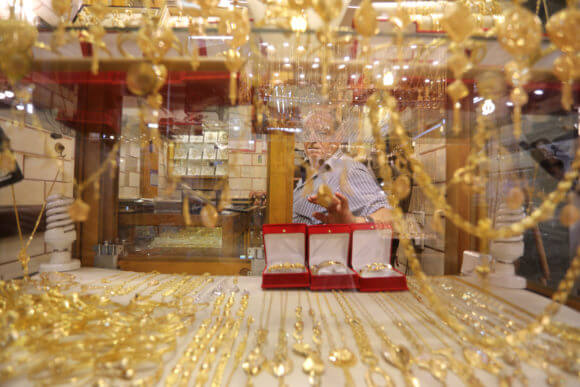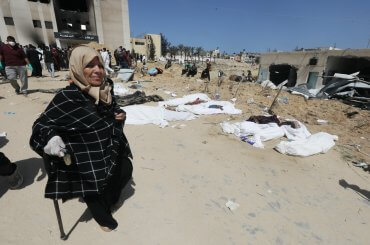Yaser Habboub, 62, was unsure how long his shop had been in business. It was passed down in his family from generation to generation. He said the foundation of the shop was constructed 543 years ago. It sits on a stretch of cobblestone that leads up to the historic Omari Mosque, the oldest mosque in the Gaza Strip dating back to the 7th century. In decades past this street was a thriving gold market with nearly 100 bustling shops squished together. Most are small, the size of a kiosk.
Habboub recalled decades ago Palestinians employed in Israel would stop by his store on their way home from work and purchase over $1,000 worth of jewelry in a single shopping trip. In that period, the late 1990s, he boasted of making his biggest sales to Palestinians with work permits to leave the Strip. Weekly buyers working in Israel would drop into his store and “not go back to their homes unless they had purchased a 21-karat necklace and ring of 20-30 grams for their wives.”
A mainstay of Habboub’s sales had been bridal gifts, gold women would wear on their wedding day, an integral part of Palestinian heritage and a hefty financial safety net for young couples who were wary of the unstable banking system.
Today newlyweds are unable today to acquire a large enough nest egg to purchase gold, or families to buy a dowry. Habboub said in the past it was customary for a groom to give his bride between 200 to 250 grams of gold, or up to $10,000 at present day prices.
Yet with Gaza’s economy in decline, Habboub has hardly any customers. Wedding sales, when they do take place, usually do not exceed 50 grams of gold, or $2,000.
Indeed, more often than not Habboub is buying gold from Palestinians who are selling off their gold investments. “Whoever had such pieces, they have sold them by now to obtain food and drink,” he said.
“New brides,” Habboub said, “starving, penniless want to sell their last gram that they saved up during the golden days to survive.”
In short, the gold market in Gaza is now a gold swap meet.


Shop owners say trends in gold sales in Gaza are tied to employment inside of Israel. Figures provided by Gaza’s Chamber of Commerce show that until the middle of the First Intifada in the early 1990s the Israeli economy provided jobs to tens of thousands of Palestinians from the Gaza Strip. By 1999 that number declined although before the start of the Second Intifada in 2000, around 26,000 Palestinian workers crossed into Israel each day from Gaza. That meant more than 15 percent of all employed Palestinians from Gaza worked inside of Israel. This figure tanked to 2 percent in 2001 after the outbreak of the Second Intifada when Israel ended issuing work permits for Palestinians from Gaza.
Habboub and other gold sellers described two golden eras of sales tied to the political climate and Palestinian access to cross into Israel for work. First in the late 1990s to early 2000s, and the second between 2011 and 2013. During the two golden eras, Habboub estimated he sold 20 times the amount of gold he sold in other periods.
During the second golden age Gaza was already under the Israeli blockade, but a vast network of tunnels operated a black market for sales and income sources.
“People had cash, so they were able to buy gold again,” Michael Ayad, 55, said. “A lucky trader at that time was proud to sell 1,500-1,700 grams a day, while one of us could feel proud today if we could sell 100 grams per week.” He added, “we were sent back to the Stone Age.”
With less customers and less sales, Ayad spends most of his day drinking tea and talking to nearby shopkeepers. Other shopkeepers said stores closed after their owners were hit by severe financial crises in recent months, some filing for bankruptcy.
As we spoke, two women entered and looked at a small ring. Elham al-Mughrabi, 28, and her mother Ruqaya al-Mughrabi, 51, were actually sellers not buyers, as Ayad expected. The daughter soberly passed him her wedding bracelet to price it.
“I came to the gold market once I was engaged five years ago, and today I come as a seller because my husband and I owe accumulated rent on our house,” al-Mughrabi said. “I have four children who are in need of supplies for Eid al-Adha on Aug. 11 and in need of supplies for the new school year later this month.”
Al-Mughrabi sold the bracelet for $154. Of course she did not buy the ring.


“I wish the next time I come here I could reimburse Elham with a new bracelet, God willing,” the mother said. “Once the woman is forced to sell her gold from her wedding, then it is the first clear signal of social destruction in her family,” Ruqaya said. She indicated there is a social stigma attached to reselling gold that was a wedding gift.
The Gold and Jewelry Union in Gaza said between 2009 and 2013, the gold sellers moved a combined 265 pounds. Today they are selling only about one fifth of that weight.


